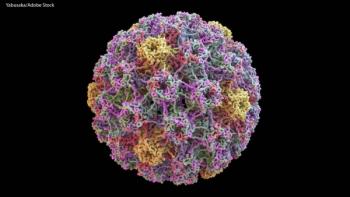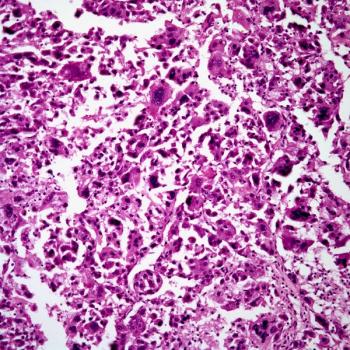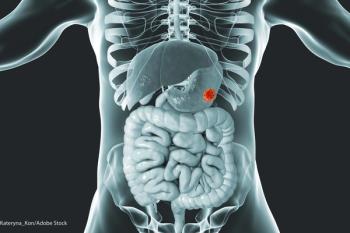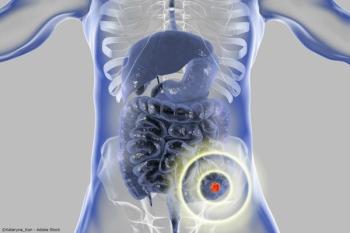
The FDA granted accelerated approval of tazemetostat (Tazverik) based on data reported in a phase II clinical trial of the methyltransferase inhibitor.

Your AI-Trained Oncology Knowledge Connection!


The FDA granted accelerated approval of tazemetostat (Tazverik) based on data reported in a phase II clinical trial of the methyltransferase inhibitor.

This research indicated that routine HPV testing may be necessary for patients with squamous cell carcinoma.

The device allows plastic surgeons and other supervised specialists to ensure consistently superior, realistic, and customizable results for nipple-areola complex tattooing.

Administering a high dose of gabapentin also increased the percentage of patients who required no opioid during treatment, indicating that patients were possibly gleaning benefits from gabapentin in both treatment arms.

The patients with BRAF V600E-mutant metastatic colorectal cancer whose disease had progressed after 1 or 2 prior regimens reported substantial improvements in quality of life over the current standard of care.

Given the data presented in this abstract, researchers indicated that it is crucial that further research works toward eliminating these disparities.

This technology identified a practical method for detecting multiple gastrointestinal cancers from a single noninvasive blood test.

These data indicate the need for surveillance and opportunities for intervention in this population.

High-quality patient reported outcomes were observed, suggesting benefits in key aspects of the patient experience with this combination treatment.

This research found that combining family history and a genetic risk score could better stratify inherited risk for developing prostate cancer.

Combined with intensive chemotherapy, the next-generation inhibitor provided excellent results in pediatric patients with Philadelphia chromosome-positive ALL, leading to changes in how this population is treated.

A recent study indicated that baseline BMI should be considered as a stratification factor in future immune checkpoint inhibitor therapy trials.

This research has the potential to aid in the development of new strategies for early detection of relapse in pediatric patients with ALL, and the development of treatments to counter clinical occurrence.

Similar health risks for colorectal cancer were observed in both African Americans and whites, though this study indicated that benefit from greater adherence may be higher at the population level for African Americans.

Incidence of early-onset gastric cancer has steadily increased in the US, now comprising >30% of new gastric cancer cases today, causing researchers to try and discover what makes this disease type unique.

These results highlight the increased prevalence of cardiovascular risk factors in these patients, and the need for personalized risk assessments for cardiac complications following cardiotoxic therapies.

This data could present a non-invasive option for characterizing tumor heterogeneity to improve personalized prognosis and treatment of patients with breast cancer.

The drug has demonstrated the ability to reduce neutropenia induced by chemotherapy without affecting bone marrow or blood-G-CSF levels.

Researchers indicated the importance in improving access to and uptake of CRC screening in these underserved populations.

This study highlighted the need for novel therapies in myelofibrosis treatment, given that salvage therapies could potentially improve patient outcomes.

In this study, researchers looked at the adoption and use of bevacizumab in order to identify opportunities to increase use of high-value therapies.

Although concurrent chemotherapy and radiation is considered standard care, treatment of locally advanced NSCLC continues to be challenging, leading researchers to search for patients who may benefit from the addition of cyclooxygenase 2 inhibitors.

This study provides data for consideration when discussing with patients the use of dietary supplements while undergoing chemotherapy.

Researchers indicated that this sort of non-pharmaceutical programming is warranted to enhance quality of life as the cancer population continues to grow.

Researchers assessed whether ctDNA could accurately differentiate metastases during the neoadjuvant period after surgery to guide therapy adaptation.

Opportunities to further eradicate opioid use as a complication of cancer care should continue to be explored regardless of the data presented according to researchers.

The criterion-based valuation framework was created with the intention of being revised as public feedback is ascertained and the landscape of cancer care evolves.

Following breast cancer diagnosis, non-breast cancer causes of death represented a significant number of deaths in this population, providing crucial understanding on how survivors should be counseled on future health risks.

This study indicated that caregivers saw improved quality of life, reduced caregiving burden, lower anxiety and depression symptoms, and improved self-efficacy and coping skills having received psychosocial intervention.

The priority review was based on results from the phase III PAOLA-1 trial comparing the addition of olaparib to bevacizumab vs the standard-of-care alone.